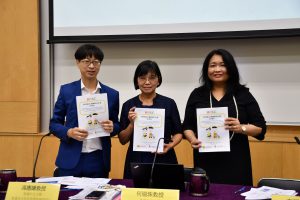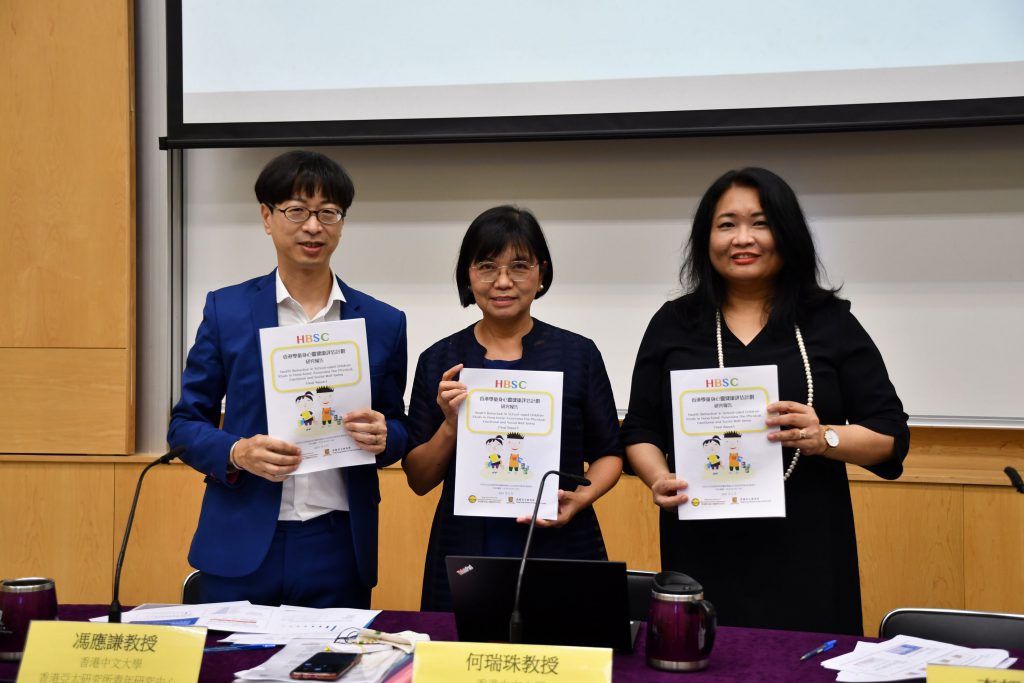CUHK
News Centre
CUHK Releases Main Study Results of Child Health Behaviour
Hong Kong Students Are Below International Health Standards
The health condition of Hong Kong students is below international standards and is an issue that warrants attention. These are the Hong Kong survey results of the Health Behaviour in School-aged Children (HBSC) 2020 Main Study conducted by The Hong Kong Centre for International Student Assessment (HKCISA) of the Institute of Educational Research and the Centre for Youth Studies of the Hong Kong Institute of Asia-Pacific Studies at The Chinese University of Hong Kong (CUHK), and released today (7 June).
From June to December 2020, the HKCISA and the Centre for Youth Studies randomly selected 5,307 students of age 11, 13 and 15 from 21 primary and 19 secondary schools for a questionnaire survey on quality of health. Results show that Hong Kong students are lower in life satisfaction and self-rated health compared to international standards, and their psychological symptoms are more severe than physical symptoms.
Survey results: Current status of Hong Kong schoolchildren’s health
Hong Kong students score 6.97 points on the life satisfaction scale, which is lower than the 7.80 points of the HBSC average. About 18% of them are very satisfied with their current life (9-10 points), which is much lower than the HBSC percentage of 36%. About 9% are dissatisfied (0-4 points), which is higher than the HBSC percentage of 7% (Figure 1). Only 16% of Hong Kong students rate their health status as “excellent”, which is far below the HBSC percentage of 36%. The proportions of Hong Kong students who rate themselves as in “fair” and “poor” health are 32% and 4% respectively, both of which are higher than the HBSC percentages of 12% and 2% (Figure 2).
Hong Kong students’ psychological symptoms are more severe than physical symptoms. About 34% to 42% of students feel low or nervous, are irritable or bad-tempered, and have sleeping difficulties at least once a week (Figure 3), and about 14% to 18% have headache, stomach ache, backache and feel dizzy at least once a week (Figure 4). Compared with the HBSC percentages, Hong Kong students are less likely to have physical symptoms, but more likely to have psychological symptoms, especially feeling low. Furthermore, Hong Kong students’ life satisfaction and self-rated health decrease with age, while their physical and psychological symptoms increase with age (Figure 5 and 6).
Health inequity among Hong Kong schoolchildren
Hong Kong girls do not differ significantly from boys in average life satisfaction (Figure 7), but their self-rated health (2.72 points) is significantly lower than that of boys (2.81 points). As for physical and psychological symptoms, the average indices of Hong Kong girls (6.68 points and 9.85 points respectively) are significantly higher than those of boys (6.09 points and 9.01 points respectively), indicating that the condition of girls is more serious than that of boys. In addition, the higher the family socio-economic status, the higher the student’s life satisfaction and self-rated health (Figure 8 and 9). On the other hand, family socio-economic status has no significant effect on physical and psychological symptoms (Figure 10).
Relationship between family factors and students’ health
Regarding family communication, students who find it easy to talk to their parents have higher life satisfaction and self-rated health, and fewer physical and psychological symptoms (Figure 11). Family support is also positively related to life satisfaction and self-rated health; the higher the level of family support, the higher the student’s life satisfaction and self-rated health, and the fewer the physical and psychological symptoms (Figure 12).
Relationship between physical activity and students’ health
The data shows that schoolchildren who do exercise for three to seven days a week have significantly higher life satisfaction and self-rated health, and have fewer physical or psychological symptoms (Figure 13). Doing exercise can improve physical and psychological conditions. However, currently 61.6% of Hong Kong students are not able to participate in at least 60 minutes of physical activity for three days a week. Of those, 22.5% of students do not participate at all, and 20.6% and 18.5% participate only for one to two days a week respectively (Figure 14).
Students’ online communication and the effects of social media use
Social networks are the major tools for Hong Kong students to communicate with their peers. About half of Hong Kong students (53%) have online contact once or more a day and 15% have online contact with close friends almost all the time every day. Excessive reliance on social networks may lead to addiction problems (Figure 15 and 16). According to the survey results, the problem of social media addiction among Hong Kong schoolchildren is not serious (only 7.5%). However, it is found that the average life satisfaction and self-rated health of problematic social media users are significantly lower, while their physical and psychological symptoms are significantly more (Figure 17).
About the HBSC
Co-ordinated by the World Health Organization (WHO) Regional Office for Europe, the Health Behaviour in School-aged Children (HBSC) is a cross-national study conducted every four years. It aims to investigate the health behaviour and well-being of 11, 13 and 15-year-old students and related factors, including family and social contexts, and to compare the physical and mental health of young people at different stages and in different countries. The HBSC is now participated in by over 40 countries and regions. This is the first time that Hong Kong has participated in the HBSC Main Study, which can serve as a benchmark for assessing Hong Kong students’ health. This study was supported by the Public Policy Research Funding Scheme from the Policy Innovation and Co-ordination Office of the Hong Kong Special Administrative Region Government (Project Number: 2019.A4.057.19B).

(From right) Professor Lee Lai Chun-hing Annisa, Centre for Youth Studies, Hong Kong Institute of Asia-Pacific Studies, CUHK, Professor Ho Sui-Chu Esther, Director, Hong Kong Centre for International Student Assessment, and Professor Fung Ying-him Anthony, Centre for Youth Studies, Hong Kong Institute of Asia-Pacific Studies, CUHK.




